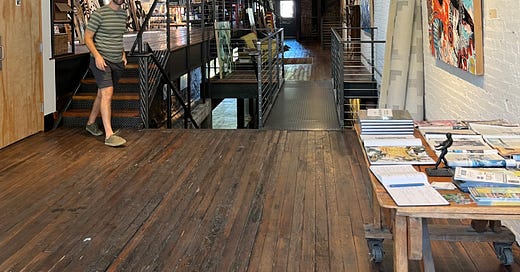Art, capital gains tax and huge differences in consumer behaviours between both sides of the Atlantic
I wrote this newsletter lying down in bed - and on my phone. This week has been Busy, I’ve loved being in London and the suburbs, and I am thinking about writing a monthly journal-esque download of what I’ve been up to… 👀
Hurricane news has been everywhere and one thing I can’t stop thinking about it the River Arts District in Asheville, North Carolina. Before Helene, it was a place filled with artist studios - you could grab a coffee and walk around, popping into studios, and chatting with the artists who work there. We spent some time with Daniel McClendon in his lovingly renovated (and very cool) warehouse.
And then the hurricane hit.
Daniel’s one of the luckier ones - most of his art and work is safe. But other businesses in the area were not so lucky. 80% of the buildings were damaged.
And then Milton came and hit Florida including Clearwater where I was a day before Helene made landfall. There was a sign outside one restaurant that said ‘We’ll be open until the letters blow off this sign’ in this midst of evacuation orders. So, it’s a complicated picture.
I don’t have any succinct thoughts to share - just wanted to add some of the context I have to this story that has been looming large in the media and on socials.
If you have wanted to donate, there’s an option to donate to the Asheville River Arts District or to Daniel directly who is distributing funds on the ground. Check out his IG.
1. How to buy art
When I moved into my own place, I wanted the walls to be adorned with original art (I was reading Gertrude Stein at the time, and was inspired by her friendships with artists in Paris in the ~1920s (like Picasso and Dalí) which led to her owning lots of great art). I had no artist friends but I did have access to Instagram. So I started following artists I liked and who fitted my requirements (they had to be London-based, and ideally female) - and ended up with quite a few pieces on my wall.
This week in London it’s the Affordable Art Fair. Tips from the article include:
Don’t overthink it; “If you can afford it and you love it, that should be enough.”
Keep an eye on graduates from the major art schools such as the Royal College of Art, Slade School of Fine Art, and Central Saint Martins - meet the artists and in a few years, their value could rocket
Pay in instalments - you can spread the cost! Own Art is an interest free financing scheme and galleries like the amazing Nelly Duff gallery on Columbia Road offer this to buyers
Most importantly, “Investment shouldn’t be the primary aim.” Yes, there’s a chance the value might go up, but it’s a small chance. The main aim of art is to enjoy it
2. What is capital gains tax (CGT) and what impact would an increase have?
Apparently the Chancellor has asked for a CGT to be modelled at 33-39%, so there is a world in which it goes up in the end of October budget.
It’s a tax you pay on profits you make on assets (property, stocks and shares, companies, some personal possessions - like art!).
There is an annual capital gains tax-free allowance of £3,000 and the tax is charged on profits above this:
10% for basic rate taxpayers (if your overall income is less than ~£50k)
20% for everyone else
There’s been talk of wealthier investors selling investments to get ahead of this predicted hike.
But for normal people, the advice is to make sure you’re using as much of your ISA (£20k) allowance - as anything in an ISA is exempt from CGT.
3. European consumers are saving, US consumers are spending
I love an economic analysis and I thought this article was hugely insightful.
European households are saving at higher rates than in the pre-pandemic era
American spending is boosting the global economy
Why?
European homeowners have more shorter-term mortgages, so they’re saving more ahead of higher interest rates on new mortgages, while many US homeowners are locked in record-low interest rates with 15- and 30-year fixed-rate mortgages (super interesting!!)
US household wealth has been increasing due to the thriving US stock market and increasing property prices - neither of which are happening in Europe
And the jobs market in the US is also booming (but there are worries that this is going to make inflation worse)
An escalation of conflict in the Middle East may be contributing to the mood of caution in Europe, which is more dependent than the US on energy supplies from the Middle East
Links!
Bake Off 2024: which appliances are in the tent and are there cheaper versions?
The fragrance industry is bigger and more annoying than ever - but here’s how fragrance works
I almost have a venue sorted for Saturday’s Money Brunch session on investing! DM me to attend. I will share learnings and insights from the event afterwards too :)





